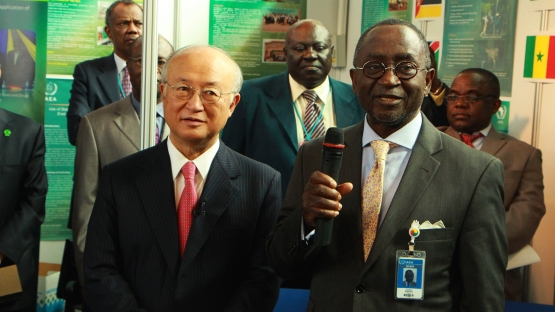Anniversaries can often be a source of opportunity; they provide us with an occasion to review past achievements, reflect on current challenges and opportunities, and look to the future with a clear vision. After a quarter of a century of productive collaboration, the States Parties to the African Regional Cooperative Agreement for Research Development and Training related to Nuclear Science and Technology (AFRA) celebrated their 25th anniversary with two lively and informative side events at the IAEA's 58th annual General Conference, held at the Agency's headquarters in Vienna, Austria.
In 1988, inspired by shared development goals and the belief that nuclear technologies could be used to help achieve them, several African Member States requested Agency support to establish a regional agreement for cooperation in the field of nuclear science and technology. After two years of consultations, the IAEA Board of Governors approved the AFRA agreement in February, 1990.
To mark AFRA's two and a half decades of technical and scientific cooperation, attendees at the General Conference were treated to an exhibition which showcased the many achievements of the agreement's signatories. IAEA Director General Yukiya Amano officially opened the exhibition on 23 September, and congratulated AFRA States Parties for their success in developing capacities and self-reliance. "The posters and products displayed in this exhibition speak for themselves… They highlight significant achievements, successes and outcomes resulting from the participation of AFRA States Parties in the TC Programme," remarked the Director General.
Following the exhibition opening, conference-goers attended a discussion panel, which focused on AFRA's historic contributions to the Millennium Development Goals (MDGs), and its future role in the post-2015 development agenda. The panel included Dr Wilfrid Solofoarisina, Chair of the AFRA Partnership Building and Resource Mobilization Committee, Dr Hamid Marah, Focal Point of the AFRA Regional Designated Centre for Environmental Isotope Hydrology, Prof Iddi Mkilaha, the outgoing AFRA Chairperson and Mr Dazhu Yang, Director of the Division for Africa.
In his opening statement, Mr Kwaku Aning, IAEA Deputy Director General and Head of the Department of Technical Cooperation stated that "We're here to celebrate AFRA's 25 years of very productive work and cooperation in the region and to take stock of the achievements and discuss where we go from here". He commended AFRA "for its continuous effort to build capacities and to enhance on a regional level the use of local infrastructure and expertise."
On behalf of the Vienna-based African Group, HE Mr Abel Adelakun Ayoko, Ambassador and Resident Representative of Nigeria to the IAEA, expressed his satisfaction with the significant achievements and successful stories within AFRA. He encouraged AFRA to further promote the peaceful uses of nuclear applications for the socio-economic development of the region.
Dr Solofoarisina devoted his presentation to taking stock of the many achievements made under the auspices of AFRA, especially with regards to crop yield improvements and animal breeding. The socioeconomic development realized by cooperation under the agreement is readily apparent, he explained, by looking at the newly-established culture and tissue laboratories, the formation of private-public partnerships, and the increased training activity among AFRA States Parties. Looking at future challenges, Dr Solofoarisina underscored the need to forge new partnerships to effectively disseminate technology to end-users in more remote or isolated locations.
The second of the three speakers, Dr Marah, brought the audience's attention to the added value of nuclear techniques, which can complement traditional methods of water resource management, and often provide critical information which standard methods cannot, such as the age and origin of water sources. Dr Marah explained that with the support of AFRA projects, the number of isotope hydrology labs in the region grew from just four in 2008 to more than 20 by 2014.
As the outgoing AFRA chairman, Prof Mkilaha spoke extensively about the agreement's contribution to the achievement of the MDGs. He noted that AFRA has the expertise and competencies necessary to contribute to almost all of the MDGs. For example, by encouraging the cultivation of more resilient, nutritious crops, AFRA's food and agricultural activities have the potential to positively affect poverty, human health and child nutrition in the region. Like his colleagues, Prof Mkilaha emphasized the challenges associated with sharing the results of projects with the whole population, but noted that he was nevertheless hopeful for AFRA's future prospects.
Lastly, Mr Dazhu Yang made reference to the GC Resolution and highlighted IAEA strategy for a more impact-oriented programme focused on producing tangible achievements. He mentioned that the modality of Technical Cooperation among Developing Countries (TCDC) is one avenue in which the IAEA helps to support AFRA, by promoting regional partnerships and facilitating the transfer of knowledge and technology to end-users.
Today, AFRA membership includes 39 African countries. Despite their diverse languages, histories and cultures, the States Parties to the AFRA agreement have closely supported one another for almost a quarter of a century, and now have a multitude of technical, socioeconomic and health-related milestones on which to look back. As the panellists reminded us, the work of AFRA is not yet complete-its States Parties will continue to meet the challenges of sustained socioeconomic development in the African continent with the support and commitment of the IAEA.


